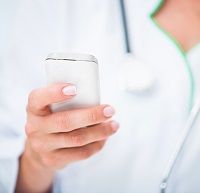Mobile Apps for Bipolar Disorder Are a Mess
Mobile phone applications offer a significant opportunity to improve treatment for bipolar disorder, but they're not ready for prime time yet. In fact, a study in the Journal of Internet Medical Research looked at the most recent apps and found significant gaps that need to be addressed, in terms of agreement with medical guidelines, comprehensive information, and privacy matters.

Mobile phone applications offer a significant opportunity to improve treatment for bipolar disorder (BD), but they’re not ready for prime time yet. In fact, a study in the Journal of Internet Medical Research looked at the most recent apps and found significant gaps that need to be addressed, in terms of agreement with medical guidelines, comprehensive information, and privacy matters.
The potential for these apps lies in the ubiquity of smartphones and the fact that symptom monitoring is a fundamental component of the self-management of BD that benefits from being performed in real-time and under natural conditions. As the study authors note, “Smartphones can also be used to deliver interventions and psychoeducation, supplement treatment, and enhance therapeutic reach in BD, as apps are cost-effective, accessible, anonymous, and convenient.” Further, patients in previous surveys and studies have generally expressed support for evidence-based mental health apps.
The researchers searched the Australian Google Play and iOS stores for English-language apps developed for people with BD. The comprehensiveness and quality of information was assessed against core psychoeducation principles and current BD treatment guidelines. Management tools were evaluated with reference to the best-practice resources for the specific area. The study also looked at general app features, how user-friendly the apps were, and privacy features.
Of the 82 apps reviewed (out of a universe of more than 500), 32 apps provided information and the remaining 50 were management tools, including screening and assessment (n=10), symptom monitoring (n=35), community support (n=4), and treatment (n=1). Less than a quarter of the apps provided a privacy policy. “Overall, apps providing information covered a third (4/11, 36%) of the core psychoeducation principles and even fewer (2/13, 15%) best-practice guidelines,” the study authors noted. “Only a third (10/32, 31%) cited their information source.” Perhaps worse still, there was no correlation between adherence to best practice guidelines and user ratings for the apps. Symptom monitoring apps generally failed to monitor critical information such as medication (20/35, 57%) and sleep (18/35, 51%), and the majority of self-assessment apps did not use validated screening measures (6/10, 60%).
The study offers many examples of even basic functionality that didn’t work properly. Of the apps that offered an alert reminding users to track their mood, 13 allowed users to designate a reminder time, 6 asked users how often they’d like to be reminded, and 3 had options for both. Over a 3-day period, seven apps failed to notify the user as directed. Sourcing was another major issue. “With only a third of information apps citing their information source, users are denied other important information by which to make informed judgments about an app’s robustness and credibility,” the study authors noted.
The researchers concluded, “These results indicate that clinicians looking to recommend apps to supplement treatment should exercise caution with app selection and that policy makers and the research community need to consider ways of assuring app quality.”